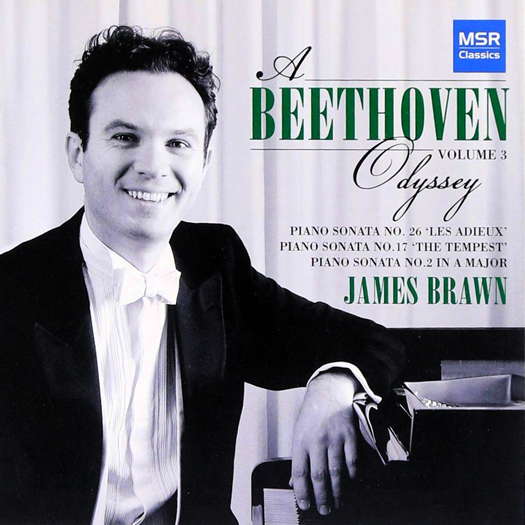 FEEDBACK: She said WHAT? Read what people think about our Classical Music Daily features, and have your say!
FEEDBACK: She said WHAT? Read what people think about our Classical Music Daily features, and have your say!

High Jinks
RODERIC DUNNETT enjoys Opera Warwick's production of Offenbach's 'La vie Parisienne'
There’s always a tingle about Opera Warwick productions. The company has an insuppressible sense of humour, which resurfaces year on year. With few exceptions (even The Coronation of Poppea is not without wry, ironic comedy), a series of young directors have been successful in converting their motley crew of talented performers into delivering sizzling stagings which are riddled with bright ideas and clever touches.
That’s certainly true of their present director, English Second Year student Aphra Hiscock, and it’s true of the company’s latest natty production (seen 7 February 2019) as well, for these qualities are exactly what Offenbach’s opera, or operetta, La vie Parisienne, like so much of his output, relies on. It’s witty, fast-moving, hilariously sculpted stuff, both the words (by Meilhac and Halévy, collaborators on many mid-nineteenth century hits) and the music. Ideally you should be splitting your sides; and much – or a proportion – of the time here, we were.
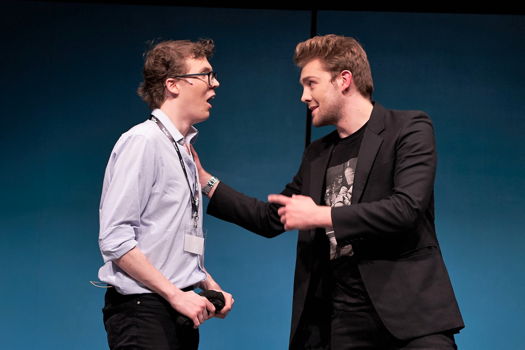
Banter from chums Gardefeu (Charlie Cooper) and Bobinet (Dominic Sterland) in Opera Warwick's production of Offenbach's 'La Vie Parisienne'. Photo © 2019 Gabrielė Stravinskaitė
We owed its successful, even fizzing, start to Charlie Cooper, a rubbery figure with elastic knees and feet – his whole body in fact – whose Gardefeu conceives an unlikely passion for a visiting Swedish baroness – his somewhat senior, Jane Burns – and spends the early scenes plotting her conquest behind the back of her equally randy husband, Jules Jackson.
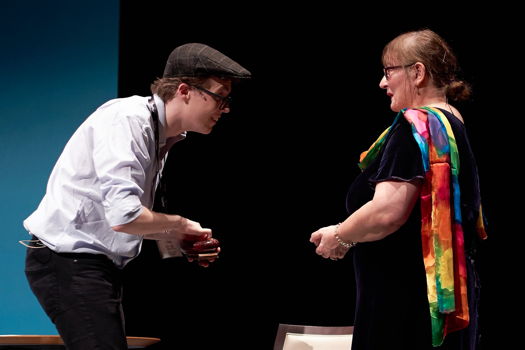
An unlikely courting - Charlie Cooper (Gardefeu) and Jane Burns (Baroness de Gondremarck) in Opera Warwick's production of Offenbach's 'La Vie Parisienne'. Photo © 2019 Gabrielė Stravinskaitė
He, meanwhile, has his eye on an upper-class tart – Warwick choral scholar Niamh Murphy (Métella), rather stylish in an all too short part, and an aptly desirable stage presence.
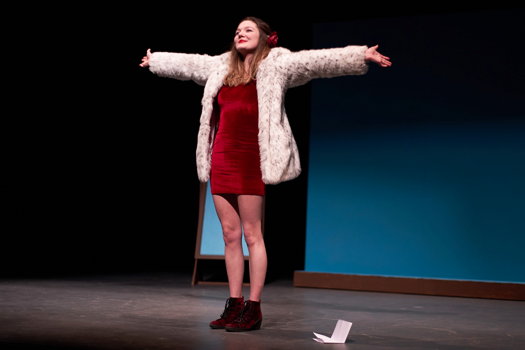
A tart with a heart - and a touch of style. Niamh Murphy as Métella in Opera Warwick's production of Offenbach's 'La Vie Parisienne'. Photo © 2019 Gabrielė Stravinskaitė
Dominic Sterland – in his first appearance for Opera Warwick, revealed some potential. His long-suffering Bobinet acts as Cooper’s able foil and confidant.
Aphra Hiscock might usefully have reined in Gardefeu a bit, for his antics – as one anticipated, fun thought they were – waxed a little repetitive. He ‘likes being in things’, and that was obvious; though even Olivier needed reining in occasionally. But you could sense her hand in the moves, which were anything but arbitrary; indeed throughout the show she kept a relatively tight handle on the bizarre unfolding. Where groups and vocal ensembles were blocked, eight times out of ten it was well devised. If the antics succeeded, it was often enough thanks to her keeping the lid on, inserting a measure of shy, or sly, suggestion, which actually made it funnier. Its look was miserable; but that was not down to her.
Were the microphones a nuisance? I’d say several of these singers – Pauline, Gabrielle, Edward Daly’s well enunciated, self-satisfied Brazilian – didn’t need them. It’s been the case, even an issue, with previous Warwick stagings. Yet I was close to one speaker, and I thought the (uncredited) technician did a good job in keeping the levels down. Hence one could catch the singer directly as well, without tiresome intermediary. With what is a pretty eminent company nowadays, should not these singers project competently as well? One or two exchanges, or even solos, came across as a bit lacklustre, thinly understood, even idle.
Not so Naomi Awre, a delicious hit as Gabrielle, who seems to have several personae as she tos and fros amid the cast, and always a pleasure musically. Gabrielle is the only character – perhaps surprisingly – who has to encompass a measure of coloratura. And that she did with wonderful aplomb, but never overdone; even appealingly restrained. The voice, never presumptuously overbearing, has a distinct and attractive character, and in passages that seem to presage Johann Strauss’s (mezzo) Prince Orlovsky, she acquitted herself with distinction.
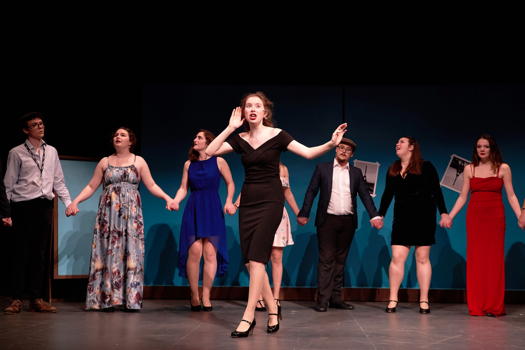
Gabrielle (the scintillating Naomi Awre) in Opera Warwick's production of Offenbach's 'La Vie Parisienne'. Photo © 2019 Gabrielė Stravinskaitė
It was easy to enjoy Reuben Wilmshurst’s ex-Germanic Frick, dottily measuring up for footwear anyone who crossed his path: a (here) moderate singing voice that brought intermittent pleasure, not least in his verbal jousting with (I assume) Awre’s Gabrielle.
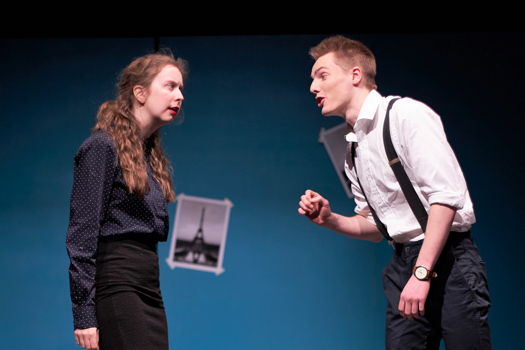
Naomi Awre (Gabrielle) and Reuben Wilmshurst as the conniving bootmaker Frick - a nicely engineered comic cameo, in Opera Warwick's production of Offenbach's 'La Vie Parisienne'. Photo © 2019 Gabrielė Stravinskaitė
The less than ubiquitous Brazilian (Daly), unexpectedly popping up to claim his amour, we have already approved of. Strong delivery, better than most.
Ruth Pugh’s Prosper made an agreeable, mellow sound: quite touching, sometimes arresting. George Booth’s lofty Urbain, alternating between flunkey, maître d’hôtel, fatuous dressed-up general, and what-not, suddenly from nowhere introduced one of the most agreeable voices of all. An utterly steady lowish bass, not dominant but instead rather sensitive, splendidly supportive to the ensemble, and with a marked beauty to the timbre.
But two of the stars were undoubted: of the cast, Pauline; and the conductor.
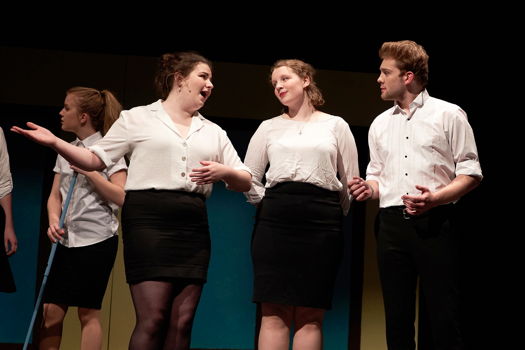
Pauline (Rebekah Lally) holds amply forth to Prosper (Ruth Pugh) and Bobinet (Dominic Sterland) in Opera Warwick's production of Offenbach's 'La Vie Parisienne'. Photo © 2019 Gabrielė Stravinskaitė
Rebekah Lally, still a First Year at Warwick, and surely rightly endowed with one of the University’s music scholarships – Daly’s Brazilian is another – produced what felt like, or at least came near, a genuine operatic tone. The tessitura is largely mezzo, and this part lay ideally within her range. When she appeared out of the mêlée to take front stage, everyone seemed to move up a notch. There was a hint of the sixth form musician about some of what preceded, but now nearly all the singing voices picked up – Sterland, donning ludicrous red beret as part of his pose, is a good example, and even Jackson’s unprepossessing Gondremarck, rather entertaining in the drinking scene – miraculously grew sturdier: spirited to a degree, but more assured, more like opera. So it was possible to enjoy the show for not just its gift for entertaining – that was patent – but for its burgeoning musical significance.
Who provided the key to the music? Conductor Laurie Duncan, Third Year Mathematician, kept a tight grip not just on his (Sir Adrian Boult-like) elongated baton, but on the whole score. His homework showed. He was absolutely the master of detail, fully confident as well as competent, and eminently reassuring. Musically his orchestra was vital, varied, driven. Crucial solos (or duets), the clarinet's gorgeous tone prefacing I think the Third Act, flute and piccolo, finely controlled brass – pretty top-notch trumpets or trombone(s), often working independently, and no blasting to excess – were stylish, well balanced, enticing. The strings as a whole were admirable, scarcely a hitch, because they clearly watched, and there was a consequent unity.
Much of this was down to Duncan’s endlessly assured beat. Too commanding? Not for this music. By treating his task so seriously, as it must be, and exerting such a firm grip, he actually enhanced the comedy, and the fun. He nurtured the chorus not least – and the chorus singing, with some first rate SATB (or more), and with endless carefully engineered dynamic rise and fall, was another of the best things in this show. The tutti – again, starting Act 3, for instance – were largely exemplary. No rhythmic proximity: everyone seemed scrupulously on the beat; with Duncan’s intelligent – and insistent – leadership, and shrewdly plotted pacing from start to finish – excellently planned and perfectly communicated ritardandi, for instance – it could scarcely have been otherwise. He could magically impart two beats in a bar, indeed virtually just one, and make it dance like a 3/4 waltz. One expects to hear more of this significant, energising musical personality.
The translation, by the late New Yorker Richard Traubner (who will have known that Boulogne is pronounced Bouloigne) served all these characters well. It had flair and agility, and encapsulated much of the inspired and naughty wit of the Meilhac/Halévy original, much of it a hoot.
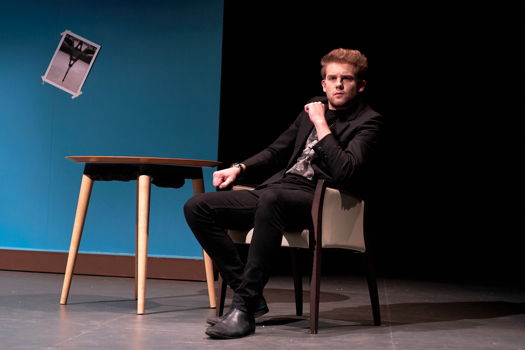
Bobinet (the increasingly impressive Dominic Sterland) ponders deep matters of life and fate in Opera Warwick's production of Offenbach's 'La Vie Parisienne'. Photo © 2019 Gabrielė Stravinskaitė
The less said about the set, the better. Its nondescriptness meant the transition between venues was almost entirely lost. There were apparently last-minute reasons for this, so best passed over; though one idea, a handless clock presiding over the stage at the start, had strangely a period feel: rather good.
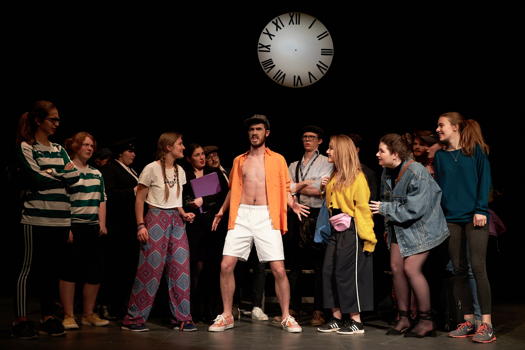
The Brazilian (Edward Daly) gees up the chorus in Opera Warwick's production of Offenbach's 'La Vie Parisienne'. Photo © 2019 Gabrielė Stravinskaitė
The costuming, at least that of the girls, sporting some attractive long dresses, was a better bet: there was a cheerful mix of colour, apt for this Offenbach, and – merely by coincidence – the only thing really suggestive of Napoleon III’s Second French Empire: the production was nominally ‘modern’ dress; the men’s was drab and lacked any imagination at all. However this dour aspect of the visuals was less of a drawback than one might have expected.
And with the neat direction, some of the feared consequent dangers were surmounted. Was this the best of Opera Warwick’s offerings to date? No, but it retained the buoyant spirit that is one of the ensemble’s most enduring and endearing features. They can be more professional, but of cheerfulness there was no lack. These young performers display an obvious appetite for opera. That can be no bad thing.
Coventry UK



